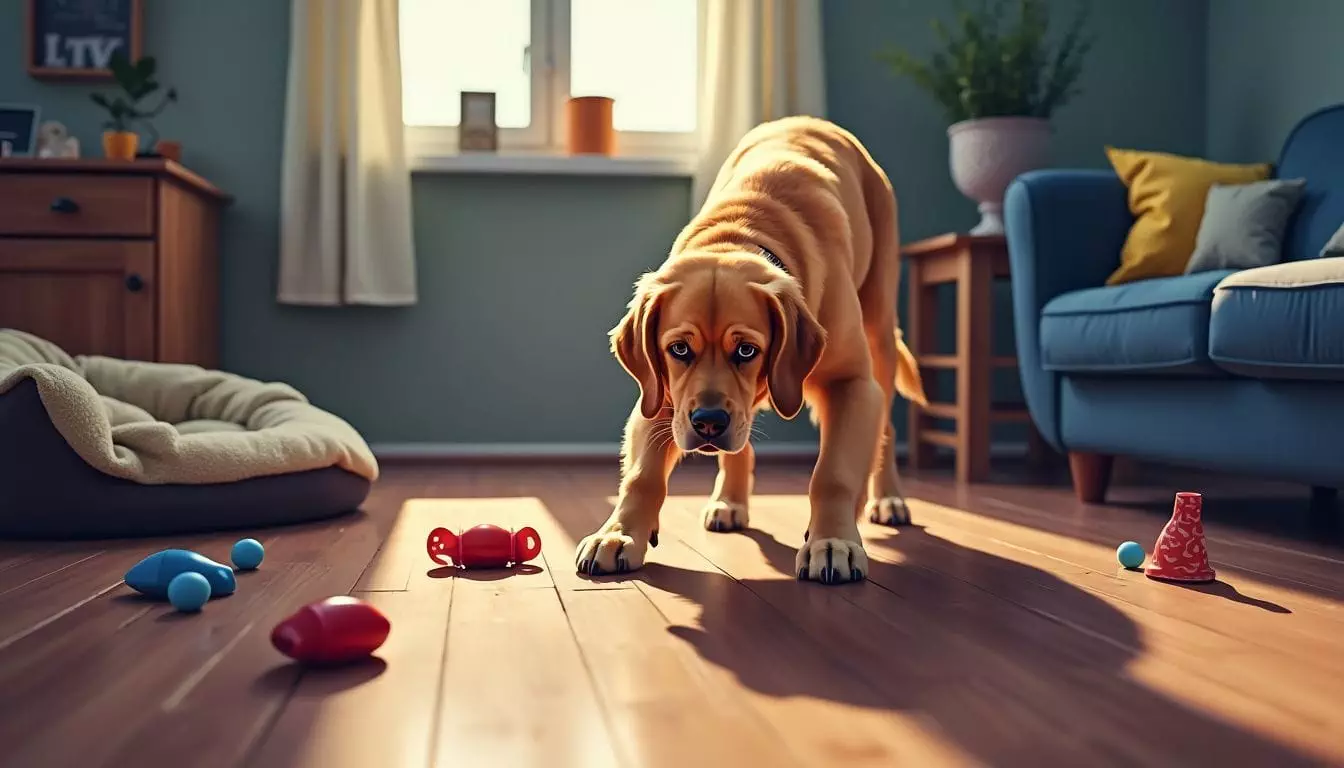Dogs scratch floors for many reasons. A sudden change in this behavior can puzzle owners. Why is my dog scratching the floor all of a sudden? This question plagues many pet parents. Dogs may scratch floors as a way to mark their territory, release pent-up energy, or even to prepare a comfortable resting spot. If this behavior starts unexpectedly, it might be linked to anxiety, boredom, or an underlying medical issue. Similarly, understanding why dogs lick the carpet can reveal clues about anxiety, boredom, or attempts to self-soothe or investigate new scents.
The answer lies in understanding canine behavior and health. Scratching can signal anxiety, boredom, or medical issues. Identifying the cause is crucial for effective solutions. 2
Our team of veterinarians and certified trainers brings decades of experience to this topic. They’ve seen countless cases of floor-scratching dogs. Their expertise helps decode this common yet perplexing behavior.
This article offers practical advice to address your dog’s new scratching habit. Learn how to spot the signs and take action. 1 3
Key Takeaways
- Dogs scratch floors due to stress, boredom, or health issues. Anxiety can cause a 33% rise in stress-related scratching.
- Vets may need weeks or months to find the cause of scratching. They might use allergy shots or steroids to help.
- Exercise, mental games, and training can stop boredom scratching. The Zigzag app offers custom training plans.
- Use deterrents like bitter apple spray or mats to protect floors. Teach commands like “leave it” to redirect dogs.
- See a vet if scratching keeps up despite your efforts. They can spot hidden health problems and suggest fixes.
Common Reasons for Sudden Floor Scratching

Dogs scratch floors for many reasons. Stress, boredom, and health issues can all cause this behavior.
Anxiety and Stress
Dogs often scratch floors due to anxiety and stress. This behavior can stem from changes in their environment or routine. Loud noises, new people, or being left alone may trigger this response.
A study by EmergencyVets noted a 33% rise in stress-related inquiries since October. Chronic itching linked to stress can create a complex behavior cycle. Some pups may develop anxiety-based OCD, leading to excessive scratching. 1
Anxious dogs might dig at carpets or wood floors to release tension. This action helps them cope with their feelings. Anti-anxiety medications can help in severe cases. Pups with allergies often show more fearfulness and touch sensitivity.
Owners should watch for patterns in their dog’s behavior to identify stress triggers. 2Boredom or Lack of Stimulation
Dogs need mental and physical activity to stay happy. Boredom can lead to floor scratching as a way to entertain themselves. 4 This behavior often happens when pets don’t get enough exercise or playtime.
A lack of stimulation can cause stress, which may result in destructive actions like scratching.
Certain breeds are more prone to boredom-related scratching. Terriers and Retrievers, for example, need lots of activity. Without proper outlets, they might turn to floor scratching for fun.
Providing toys, puzzles, and regular walks can help prevent this issue. Mental games also keep dogs engaged and less likely to scratch out of boredom. 3
A tired dog is a good dog. Mental stimulation is just as important as physical exercise in preventing unwanted behaviors.
Health Issues and Discomfort
Beyond boredom, health issues can trigger floor scratching. Pain from arthritis or skin problems often causes dogs to scratch. Itchy skin due to allergies or infections makes dogs seek relief.
Chronic itch usually stems from inflammatory skin diseases. Some breeds have a higher risk of skin disorders because of their genes. 5
Vets may use allergy shots or steroids to treat itching. Diagnosing the cause can take weeks or months. If your dog keeps scratching despite your efforts, see a vet. They’ll check for underlying medical issues and offer the right treatment. 6
Identifying the Cause of Your Dog’s Behavior
Watch your dog closely to spot what triggers the scratching. A vet check can rule out health issues and point to the real cause.
Observing Patterns and Triggers
Dog owners can spot patterns in their pet’s floor scratching. They should note when and where it happens most. This helps find the cause. Triggers might include new noises, changes in routine, or recent events. 7Keeping a log of scratching episodes proves useful. It tracks time, place, and what happened before. This info helps vets diagnose the issue. Owners can also try to recreate triggers to confirm their hunches. 8
Consulting with a Veterinarian
Vets play a key role in finding out why dogs scratch floors. They can spot health issues that cause this behavior. A vet will check the dog’s skin, ears, and paws for signs of trouble.
They may run tests to rule out allergies or infections. Vets can also tell if the scratching comes from stress or boredom. 10
Experts at the University of Pennsylvania’s Ryan Veterinary Hospital offer top-notch care for itchy dogs. They suggest a full check-up for older pets who start scratching. If the problem keeps up, vets might prescribe meds like Benadryl.
A dose of 50 mg every eight hours can help ease itching. For long-term issues, vets create plans to manage chronic itch. The next step is to look at practical ways to stop floor scratching. 9
Practical Solutions to Discourage Floor Scratching
Dogs need mental and physical exercise to stop scratching floors. Owners can use toys, games, and training to keep their pets busy and happy.
Providing Adequate Exercise and Mental Stimulation
Dogs need daily exercise and mental challenges. Regular walks, playtime, and training sessions keep them happy and healthy. Puzzle toys and games stimulate their minds. The Zigzag app helps create a personal training schedule.
These activities burn excess energy and reduce boredom-related scratching. A tired dog is less likely to engage in destructive behaviors. 11
Introducing new experiences also helps. Take different routes on walks or visit new parks. Teach new tricks or commands. Hide treats around the house for a fun scavenger hunt. These activities keep dogs engaged and less focused on scratching floors.
A mix of physical and mental exercises provides the best results for curbing unwanted behaviors. 8
Using Deterrents and Protective Measures
Pet owners can use safe deterrents to stop floor scratching. Bitter apple spray or double-sided tape on target areas often works well. Protective measures like rugs or plastic mats shield floors from damage.
These barriers block access to favorite scratch spots. 12
Training helps too. Teach commands like “leave it” to redirect the dog’s focus. Offer toys or chews as alternatives. Regular nail trims prevent accidental scratches. An enzyme cleaner removes scent markers that might trigger more scratching. 7
Training and Behavior Modification Techniques
Understanding different dog breed characteristics can also inform how to best train and redirect their behavior. For example, some breeds may be more prone to digging or scratching due to their natural instincts or energy levels. By tailoring training and behavior modification techniques to the specific traits of the dog’s breed, owners can more effectively address and prevent unwanted scratching behavior. Additionally, seeking guidance from a professional trainer or behaviorist can provide valuable insights and strategies for working with a dog’s individual needs and tendencies.
Dog owners can use positive reinforcement to change floor-scratching behavior. Reward your pup with treats or praise when they stop scratching on command. Create a designated digging area outdoors with loose soil or sand.
This gives dogs a proper outlet for their natural digging instincts. The Zigzag app offers personalized training programs to address specific behaviors. It provides 24/7 support from professional trainers to guide owners through the process.
Consistency is key – stick to the training plan daily for best results. 7
Cooperative care training helps manage underlying issues like allergies that may cause scratching. Teach your dog to accept handling of paws and nail trims calmly. This makes it easier to check for and treat skin irritations.
For anxious dogs, desensitization techniques can reduce stress-related scratching. Gradually expose them to triggers in a controlled way. Pair the exposure with positive experiences to build confidence over time. 8
Understanding Puppy Behavior: When Whining and Scratching Start
Puppies often start whining and scratching as they grow. These behaviors can stem from various causes. Teething pain, for example, may lead to increased chewing and scratching. Puppies also scratch to mark their territory or seek attention.
Growing pains can trigger discomfort, causing puppies to whine or scratch more. 13
Stress from new experiences like grooming can change a puppy’s behavior. They might scratch floors or whine to cope with anxiety. Allergies are another common trigger, causing itching and licking.
Owners should watch for patterns in their puppy’s actions. A vet visit is crucial if symptoms persist. This helps rule out health issues and ensures proper care for the developing pup. 14
When to Seek Professional Help
Dogs need expert help when scratching persists. A vet can spot hidden health issues and suggest fixes.
Persistent Scratching Despite Interventions
Persistent scratching in dogs can signal serious health issues. Vets often need weeks or months to diagnose the root cause. 10 Some conditions require lifelong treatment. Allergy shots and steroids may help manage symptoms.
If your pup keeps scratching after trying home remedies, it’s time to see a pro. EmergencyVets offers 24/7 expert help for urgent cases. 8 For quick answers, JustAnswer provides vet responses in minutes.
Proper diagnosis and care are key to stopping the itch and improving your dog’s quality of life. Signs of physical pain or distress may accompany persistent scratching.
Signs of Physical Pain or Distress
Dogs show pain in many ways. They may limp, whine, or avoid certain movements. Some dogs become more aggressive or withdrawn when hurting. Others might pant excessively or lick a specific area.
Changes in eating, sleeping, or bathroom habits can also signal discomfort. Pet owners should watch for these signs and seek vet care if they persist. 16 Additionally, any abrupt shifts in these habits may indicate underlying health issues that need to be addressed promptly. For instance, if a dog starts peeing on the bed, it could be a sign of anxiety or a medical condition that requires attention. In such cases, researching dog peeing on bed solutions can be helpful, as it not only addresses the behavior but also the root causes of the distress.
Physical exams help vets find the source of pain. They check for swelling, tenderness, and reduced range of motion. Blood tests and x-rays may reveal underlying issues. Chronic pain often leads to behavior changes like house-soiling or resource guarding.
Proper pain management can improve a dog’s quality of life and reduce problem behaviors. 15
Conclusion
Dog floor scratching often signals deeper issues. Owners must watch for patterns and consult vets when needed. Quick action can solve many scratching problems. Proper care, exercise, and training help prevent future issues.
With patience and understanding, dogs and owners can enjoy a scratch-free home life.
FAQs
1. Why is my dog suddenly scratching the floor?
Your pup might scratch for many reasons. Boredom, anxiety, or marking territory are common causes. It could also be a sign of physical discomfort or long nails. Watch for other odd behaviors to help pinpoint the cause.
2. How can I stop my dog from digging at the carpet?
First, rule out health issues with a vet check. Then, give your dog more exercise and mental stimulation. Use toys to keep them busy. If it’s attention-seeking, ignore the behavior and reward calm times. Training can help too.
3. Is floor scratching normal for all dog breeds?
Some breeds, like terriers or schnauzers, dig more due to their history. But any dog may scratch floors. Wild dogs dug dens, so the urge is natural. Adult dogs often do it less than puppies. If it’s new or excessive, check with your vet.
4. Could scratching indicate a health problem?
Yes, it could. Scratching might show skin issues, allergies, or even ear infections. Older dogs may do it due to joint pain or cognitive changes. A physical exam can rule out medical causes. Always consult your vet for sudden behavior changes.
5. Does my dog scratch the floor because of separation anxiety?
It’s possible. Dogs with separation anxiety often scratch, dig, or bark when left alone. They might focus on doors or windows. If your dog only does this when you’re gone, anxiety could be the cause. A pro trainer can help with this issue.
6. How do I trim my dog’s nails to prevent floor scratching?
Long nails can make dogs uncomfortable, leading to scratching. Trim nails regularly or visit a groomer. If you hear clicking on hard floors, the nails are too long. Some dogs need more frequent trims. Ask your vet to show you how to do it safely at home.
References
- ^ https://yourvetwantsyoutoknow.com/anxiety-and-allergies/ (2023-03-13)
- ^ https://fremont.earthwisepet.com/content/other/Understanding-Signs-of-Dog-Stress-Nervously-Scratching/
- ^ https://www.psychologytoday.com/us/blog/animal-emotions/201903/ground-scratching-dogs-scent-sight-and-ecstasy
- ^ https://wellbeloved.com/blogs/caring-for-dogs/why-is-my-dog-itching?srsltid=AfmBOooldzT9l593Doio43lvSF-a8eAaQgaydzReZoR3eUGM_m77XKIx (2024-03-22)
- ^ https://sevneurology.com/blog/dog-constantly-scratching
- ^ https://zigzag.dog/en-us/blog/puppy-behavior/understanding-your-puppy/why-do-dogs-scratch-the-floor-8-reasons-explained/ (2023-01-25)
- ^ https://eileenanddogs.com/blog/2014/12/02/dog-ground-scratching-elimination/
- ^ https://www.akc.org/expert-advice/health/why-is-my-dog-so-itchy/ (2023-08-11)
- ^ https://vcahospitals.com/know-your-pet/pruritus-itching-and-scratching-in-dogs
- ^ https://vogdog.com/en/why-does-your-dog-scratch-the-floor-and-how-to-counteract-it (2023-08-15)
- ^ https://www.masterclass.com/articles/why-do-dogs-scratch-the-floor
- ^ https://www.justanswer.com/dog-health/5c6xb-dog-whining-scratching-can-t-lay-still.html (2011-07-29)
- ^ https://www.countrylife.co.uk/out-and-about/dogs/what-to-do-if-your-dog-is-scratching-things-at-night-by-expert-trainer-ben-randall-252613
- ^ https://www.akc.org/expert-advice/health/signs-dog-is-in-pain/ (2024-02-26)

